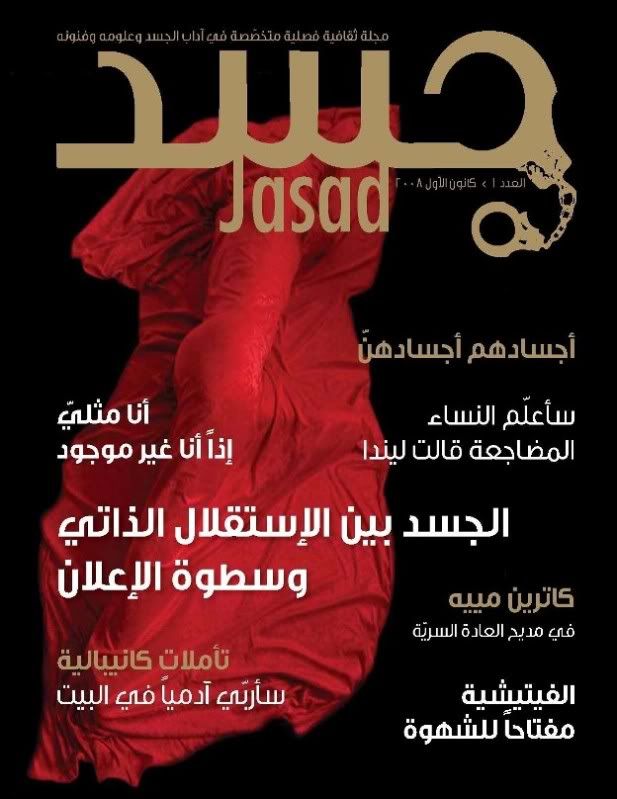
In its first issue, published last December, some fifty writers and artists, a majority of whom are Arabs, full-frontally — and totally exposed, too, for pseudonyms are not allowed — tackle a multitude of taboos linked, one way or another, to the body. Some remember “their first times,” others dissect social subjects related to the body, and yet others, finally, deliver erotic stories amid the photos of very languid and . . . very much naked women.
These writers and artists freely submitted to the two obsessions of the “mistress” of Jasad, Lebanese poet Joumana Haddad: the body and taboos. This 38-year-old woman wants to unveil the body in a region where people would rather hide it. As for taboos, the mother of two children wants to break them like the handcuffs attached to the letter “J” of Jasad on the cover of the magazine.
“Jasad isn’t the Arabic version of Playboy. My goal wasn’t to create controversy. Professionally, I have attained many of my goals, and I don’t need a scandal to make me famous,” Joumana Haddad straight away issues her declaration in her delicate voice. “The sexual dimension of the body has an important place in the magazine, but that’s not all there is to it,” she insists.
Jasad is, for Joumana Haddad, a piquant reminder, in Arabic, addressed to the Arab community. “People have forgotten that the body is palpable in the Arab literary tradition, with texts like The Perfumed Garden (an erotic manual in Arabic in the 16th century) and the uncensored version of One Thousand and One Nights,” explains the poet. Whereas today metaphors are used to refer to sexual organs, “words like penis and vagina were employed in ancient texts,” she maintains. “Jasad aims to understand why, over time, it became a taboo, in this region, to talk about the body.”
Joumana Haddad ventures a few ideas by way of explaining this regression in the matter of the freedom of expression, from the “Molotov cocktail of religious power, whose objective is to control the masses,” to a reaction of the East seeking to protect and differentiate itself from the West.
Some, not surprisingly, didn’t appreciate the reminder. “I’ve received insulting emails,” says Ms. Haddad. Anonymous emails, of course. “I expected a lot more problems,” she admits. Jasad was registered with the relevant Lebanese authorities, but the censor didn’t react; the first 3,000 copies sold like hotcakes, and Joumana Haddad has printed 2,000 additional copies. “I think that there’s a real demand for this type of magazine and that its success is an indication of a veritable change in mentality in this region. People need to be able to have a different way of life.”
The success moreover goes beyond the Lebanese borders: the demand for subscriptions, the preferred mode of purchase on the part of foreign readers, keeps growing. Starting with 100 at the debut of the first issue, the number of subscribers has risen to 400 today. The biggest demand comes from Syria, Dubai, Egypt, and . . . Saudi Arabia. To get around the strict censorship in these countries, Haddad found a way: magazines are directly mailed to subscribers. Saudi Arabia, which has prohibited the sale of the magazine on its territory, has also blocked the Jasad Web site.
No matter — Jasad‘s adventure continues. The second issue is due out in March. And it should be available in London and Paris. Financially, Joumana has committed her own money to this venture. “Initially, I had a financial partner, but when he began to ask questions about the content, I dropped him immediately. The main thing is to safeguard my freedom,” explains the youthful woman, who is waiting to see how the second issue fares — that is to say, after the effects of “novelty and curiosity” have been absorbed — to really judge the success of her magazine.
Nevertheless, Joumana Haddad can already count on unmistakable signs: authors are beginning to scramble to attach their signatures to the bottoms of Jasad‘s glossy pages.
The original article “Liban / «Jasad», le corps dévoilé” was published by Babelmed on 12 February 2009. Translation by Yoshie Furuhashi.
